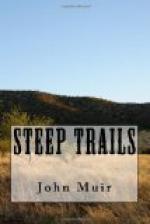Presently the storm broke forth into full snowy bloom, and the thronging crystals darkened the air. The wind swept past in hissing floods, grinding the snow into meal and sweeping down into the hollows in enormous drifts all the heavier particles, while the finer dust was sifted through the sky, increasing the icy gloom. But my fire glowed bravely as if in glad defiance of the drift to quench it, and, notwithstanding but little trace of my nest could be seen after the snow had leveled and buried it, I was snug and warm, and the passionate uproar produced a glad excitement.
Day after day the storm continued, piling snow on snow in weariless abundance. There were short periods of quiet, when the sun would seem to look eagerly down through rents in the clouds, as if to know how the work was advancing. During these calm intervals I replenished my fire—sometimes without leaving the nest, for fire and woodpile were so near this could easily be done—or busied myself with my notebook, watching the gestures of the trees in taking the snow, examining separate crystals under a lens, and learning the methods of their deposition as an enduring fountain for the streams. Several times, when the storm ceased for a few minutes, a Douglas squirrel came frisking from the foot of a clump of dwarf pines, moving in sudden interrupted spurts over the bossy snow; then, without any apparent guidance, he would dig rapidly into the drift where were buried some grains of barley that the horses had left. The Douglas squirrel does not strictly belong to these upper woods, and I was surprised to see him out in such weather. The mountain sheep also, quite a large flock of them, came to my camp and took shelter beside a clump of matted dwarf pines a little above my nest.
The storm lasted about a week, but before it was ended Sisson became alarmed and sent up the guide with animals to see what had become of me and recover the camp outfit. The news spread that “there was a man on the mountain,” and he must surely have perished, and Sisson was blamed for allowing any one to attempt climbing in such weather; while I was as safe as anybody in the lowlands, lying like a squirrel in a warm, fluffy nest, busied about my own affairs and wishing only to be let alone. Later, however, a trail could not have been broken for a horse, and some of the camp furniture would have had to be abandoned. On the fifth day I returned to Sisson’s, and from that comfortable base made excursions, as the weather permitted, to the Black Butte, to the foot of the Whitney Glacier, around the base of the mountain, to Rhett and Klamath Lakes, to the Modoc region and elsewhere, developing many interesting scenes and experiences.
But the next spring, on the other side of this eventful winter, I saw and felt still more of the Shasta snow. For then it was my fortune to get into the very heart of a storm, and to be held in it for a long time.




